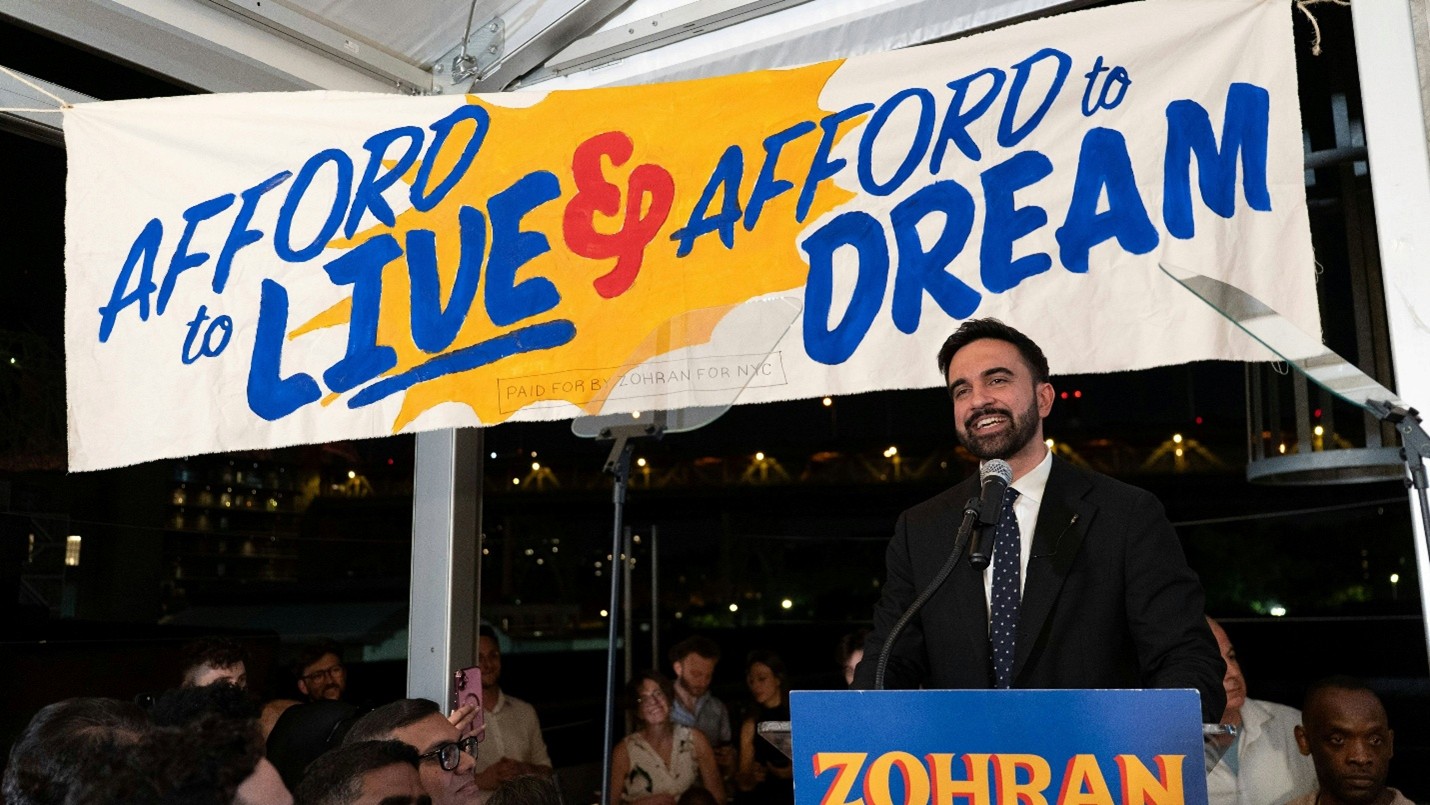
‘He’s my Mayor! (I live in…)’ Why does Zohran Mamdani’s win feel like a win for everyone?
If you’ve been online this week, you’ve probably seen the reaction to New York’s mayoral election. Zohran Mamdani — a 34-year-old Democratic Socialist — won the mayoralty, becoming the city’s youngest mayor in over a century and its first Muslim and South Asian mayor. That alone explains some of the attention. But it doesn’t explain the emotion — the laughter, the relief, the pride, the feeling that this was not simply an election, but something people needed.
What followed wasn’t the usual civic applause for a distant politician. Mamdani’s win has felt personal even to people who have never set foot in Queens because he did not campaign as someone above everyday life. He campaigned from within it. His platform was disarmingly straightforward: freeze rents for two million tenants, make buses free, expand childcare, and tax the very wealthy to fund it. Not a utopia. Just the ability to stay.
Before this election, he represented roughly 130,000 residents in Astoria as a state assemblymember, where he worked on taxi-medallion debt relief and tenant protections. When critics called him inexperienced, he didn’t hide behind spin: “What I don’t have in experience, I make up for in integrity.” That line, raw, lit up across social media.
And unlike most polished candidates, he did not try to sand down his humanity. He showed up at a PinkPantheress concert in Brooklyn a few nights before the election, bouncing in a crowd like someone who still belongs to the world. A rally of his was MC’d by Italian-Jewish comedian Gianmarco Soresi. He did Hasan Piker’s podcast not as a stunt but because he is fluent in that language — the language of the chronically online, the disillusioned, the hopeful-but-tired younger generations who are rarely spoken to by politics, only spoken about.
And it’s here that his global resonance surfaces. Because he refuses to hide his identity — as a Muslim, South Asian, and child of the diaspora — not in the superficial way that identity politics is often wielded, but in the way belonging does when it is lived. Mamdani is Ugandan-born, Indian in heritage, Muslim by faith, and deeply shaped by diaspora. His mother is filmmaker Mira Nair; his father is scholar Mahmood Mamdani. He has spoken openly about the histories of migration, colonialism and violence that shaped his family. This reflected in his campaign as well; speaking different languages in his online campaign videos, visiting gurdwaras, mosques, synagogues, and churches, and celebrating Diwali at a city event, among others.
Yet Mamdani also laid bare his convictions. He labelled Narendra Modi a “war criminal” for his role in the 2002 Gujarat riots, and said he would refuse to share a platform with the Indian prime minister if he visited New York. He pledged that if elected, he would uphold the ICC arrest warrant for Benjamin Netanyahu for war crimes in Gaza, saying: “It is my desire to ensure that this be a city that stands up for international law.” These stances provoked sharp backlash from India’s BJP and the Israeli government, but they also signalled something: that local politics can stare right into global fractures and say, we will not stay silent.
Then came another signal of strength: the transition. Mamdani announced an all-women transition team, led by executive director Elana Leopold and co-chaired by Maria Torres-Springer, Grace Bonilla, Melanie Hartzog and Lina Khan. Khan, former chair of the U.S. Federal Trade Commission, is known for aggressive antitrust enforcement and her work on tech and corporate dominance. The message was clear: his leadership would not only be historic in identity, but structural in power. A city hall built by women, steered by ethical and institutional reform, ready for national and international impact.
That is why the reaction has felt like a diaspora celebration and also something more transnational. His victory is not being claimed as representation. It is being claimed as proof — proof that someone who looks like us, prays like us, jokes like us, dances like us, gets tired like us, worries about rent like us, can hold power not as spectacle but as responsibility.
We are in a global political moment defined by collapsing trust in institutions, widening economic precarity, and a sense that politics has become either punitive — obsessed with discipline — or performative, full of symbolic language but empty outcomes. Mamdani’s win hits like relief because he did not treat everyday survival as a policy abstraction. He treated it as the centre of politics. He didn’t sell hope. He made hope seem administratively achievable.
And yes — there is joy in the aesthetics of it, too. His Bollywood exit music. The multilingual campaign TikToks. The way he quoted Nehru and used “ana min kum wa lakum” — I am from you and for you — knowing that phrase has been cheapened by politicians before, yet reclaiming it in his electoral speech.
Mamdani’s victory is more than a local triumph; it resonates across continents because it embodies a new possibility in politics. In a world grappling with inequality, institutional distrust, and rising xenophobia, his rise signals that leadership can be both human and effective, rooted in the lived realities of citizens. From Queens to Kampala, from Brooklyn to London, his win feels personal and universal at once: it validates the aspirations of immigrant communities, inspires younger generations, and reminds the world that governance can reflect care, responsibility, and justice. By combining everyday solutions with structural reform, Mamdani shows that local elections can send ripples of hope far beyond city limits. In this sense, his victory is not just New York’s; it is a shared win for anyone who believes politics can be both accountable and aspirational — and that, perhaps for the first time in a long while, power can feel like it belongs to the people.
Edited by: Daniel Groves
Image: Der Demokrat Zohran Mamdani gewann überraschend die Vorwahlen für das Bürgermeisteramt in New York City, IMAGO / SOPA Images via Heute.at, 2025 // CC BY 4.0



Average Rating